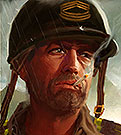warspite1
Posts: 41353
Joined: 2/2/2008
From: England
Status: offline

|
quote:
ORIGINAL: Fallschirmjager
I have always been surprised that given that England was such a powerful and traditionally strong navy that they did not put more effort and resources into their submarine branch.
If they could of had about 2 dozen boats at the outset of hostilities and then committed 2 dozen more in the first few months I wonder if the war would have ended any sooner and with fewer casualties.
Warspite1
Fallschirmjager, a couple of points re your post:
- The British Royal Navy (RN) was - on paper - the largest navy at the start of WWII. However, the numbers of BB's/BC's and CV's in particular, masks an inescapable truth; a lack of money in the inter-war years meant that the RN was in no way as strong as simple numbers indicate. This problem affected the submarine service just as much as the surface fleet.
- Despite this, the RN's submarine service was the same size as the Kriegsmarine's in 1939 and - despite being smaller than the Japanese and Italian sub fleets - was to prove far more effective.
- I assume you mean December 7th as the start of hostilities rather than September 3rd? If so, then I think that given the lack of ASW capability of the IJN then such a policy may have paid dividends, however there was:
a) a general mis-reading of the threat that Japan posed by the politicians - how else do you explain no tanks, Spitfires or even Hurricanes (iirc) in Malaya and the sending to that colony of Force Z 
b) a desperate need for subs in the Mediterranean, even if that threat had been taken seriously. 24 (and ultimately 48) boats in the Pacific would have been beyond the RN's capability at that time.
c) even if possible, the subs would have needed to have caused sufficient problems for the Japanese to stop - or at least seriously delay - the conquest of Malaya/Singapore and the NEI. Even with hindsight, is that a realistic expectation? I don't know (although I suspect not), but its an interesting what if.
< Message edited by warspite1 -- 6/26/2011 8:53:57 AM >
_____________________________
England expects that every man will do his duty. Horatio Nelson October 1805  |
 Printable Version
Printable Version









 Not to meantion a certain Mr Hitler.
Not to meantion a certain Mr Hitler.




 New Messages
New Messages No New Messages
No New Messages Hot Topic w/ New Messages
Hot Topic w/ New Messages Hot Topic w/o New Messages
Hot Topic w/o New Messages Locked w/ New Messages
Locked w/ New Messages Locked w/o New Messages
Locked w/o New Messages Post New Thread
Post New Thread